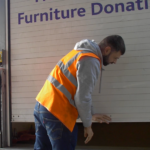Criminal Justice, Glasgow Health & Social Care Partnership
The Caledonian System consists of a behaviour change programme for men convicted of domestic abuse offences and support, safety planning and advocacy services for their (ex) partners and children. It was introduced into Glasgow Justice Services in 2019. National data informs that just under 50% of clients that have a Caledonian Condition to their Community Payback Order (CPO) in Scotland are within Glasgow justice Services.
Men attend as a requirement of a Community Payback Order or post release license, for at least two years. The Caledonian System men’s programme is designed as a resource to courts for dealing more effectively with men who commit domestic abuse-related offences than other sentencing options do.
- Assessment.
- Programme of intervention comprising 14 sessions carried out on a 1:1 basis (note a session can, on occasion take several weeks to complete),
- Rolling group-work element of 22 weekly sessions.
- Either group or individual post-group maintenance sessions over the remainder of the Community Payback Order, or post-release license (supervised release order, parole or non-parole license or as part of an extended or life sentence).
The Caledonian Men’s Programme can also be delivered on a 1:1 basis in its entirety for some men for whom group-work would not be appropriate.
Alongside this, we work with other agencies, to provide support to the men and reduce the risk that they pose. Whilst holding the man to account for his behaviours is integral to the programme, a trauma informed approach, with positive relationship building between the man and his worker, is key to enabling the process of change.
The Women’s Service provides safety planning, information, advice, advocacy and emotional support to female partners and ex-partners of the men who participate in the programme.
The Children’s Service seeks to ensure that the needs of the children whose parents are involved with the Caledonian System are met, and their rights upheld.
Experience has taught us that having Men’s, Women’s and Children’s Workers co-located within the same office space strengthens the system by promoting more effective communication and information sharing between workers. The Caledonian Team are also co-located with ASSIST, NORM Team (non-offence reporting mechanism), and Police Scotland.
Having agencies together on site, all working in the field of domestic abuse has immeasurably strengthened the effectiveness of our approach to tackling domestic abuse, with initiatives, such as the police notification scheme, in which the Caledonian team are notified when men who attending the programme are charged with any further offending, assisting to increase the safety of the women and children in Glasgow.
The uptake of the service has exceeded expectations. The team currently supports 220 men, with support provided to 260 women and 30 children. The development of additional risk management processed in relation to domestic abuse such as MARAC (multi-agency risk assessment conference), MAPPA (multi-agency public protection arrangements) and DSDAS Disclosure Scheme for Domestic Abuse Scotland) provide a robust response and assist in ensuring the safety of women and children we support.
Recent evaluations of the Caledonian System have identified that women and children feel safer with the intervention and support it provides. The Ipsos Mori report completed in 2016 provided an evaluation of the programme. The Women have reported that they feel safer with the awareness that their engagement works alongside the Men’s programme. Positive reports have also been obtained from men. Men reported a number of positive changes following the completion of the programme:
- development of ability to control their behaviour and reactions;
- better communication with (ex) partners;
- development of their understanding of what is abusive and appropriate behaviour in relationships;
- an increased understanding of gender inequalities; and
- the development of a positive mindset.
The Caledonian System, along with learning from the Safe & Together Model and Safe Lives, along with the development of Glasgow City Council’s Domestic Abuse Strategy, is starting to shift culture and practice in terms of how we approach perpetrator work, and support and increase the safety of women and children. You can read more about the developing strategy and how Caledonian System plays in another article ‘Strategic Plan to Reduce Gender Based Violence’ by my colleague Dominic Clarke.

The success of the Caledonian System has sparked international attention. The Working with Perpetrators European Network (WWP EN) have cited the Caledonian System as an example of best practice when engaging with perpetrators of domestic abuse particularly because of the integration of work with women and with children. Glasgow’s Caledonian Project and partner agencies will be involved in hosting delegates from the WWP EN for a day supporting them to consider the model and how it could develop the practice in their respective countries.
Moving forward, Glasgow Justice Social Work are committed to striving to ensure we have a robust evidence based approach to tackling Domestic Abuse, this will involve strengthening our working practices within Justice Service and indeed as a health and Social Care Partnership, many of these developments are outlined in the Domestic Abuse Strategic Plan.




